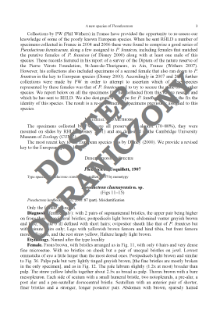- Search in all Repository
- Literature and maps
- Archeology
- Mills database
- Natural sciences
Advanced search
Advanced search
Advanced search
Advanced search
Advanced search

Object
Title: A new species of Megaselia (Diptera: Phoridae) attacking a wasp and a bee (Hymenoptera: Vespidae, Eumeninae and Megachilidae) in South Korea
Creator:
Lee, Heung-Sik ; Disney, R. H. L. ; Polska Akademia Nauk. Muzeum i Instytut Zoologii
Date issued/created:
Resource type:
Subtitle:
Fragmenta Faunistica, vol. 47, no. 1 ; Gastrotricha in littoral ; Fauna bentosowa i epifityczna brzuchorzęsków (Gastrotricha) w litoralu jeziora mezotroficznego
Publisher:
Museum and Institute of Zoology, PAS
Place of publishing:
Description:
Bibliogr. p. 86-87 ; P. 81-87 ; 25 cm ; Abstarct in Polish. Taxa in Latin.
Type of object:
Abstract:
Newly emerged females of Megaselia sextovittata sp. n. and M. chapmani Borgmeier are reported imbibing haemolymph from the pupae of Chalicodoma sculpturalis (Megachilidae) and Anterhynchium flavomarginatum (Vespidae, Eumeninae). Pupae thus attacked subsequently died.The larvae are reported to be parasitoids of the larvae of these two species of Hymenoptera, butpossibly only develop in hosts that are already debilitated or moribund. No newly emerged flies were observed ovipositing into or onto living host pupae. The feeding on the haemolymph of potential host pupae, by causing the death of those thus attacked, is likely to prevent the normal defensive response that would inhibit the development of the fly larvae in still living pupae. This may have been one route by which the evolution of the parasitoid habit in Phoridae evolved.
Relation:
Volume:
Issue:
Start page:
End page:
Detailed Resource Type:
Format:
Resource Identifier:
oai:rcin.org.pl:54543 ; 10.3161/00159301FF2004.47.1.081
Source:
MiIZ PAN, call no. P.256, T. 47 nr 1 ; MiIZ PAN, call no. P.4664, T. 47 nr 1 ; click here to follow the link
Language:
Rights:
Rights Reserved - Restricted Access
Terms of use:
Digitizing institution:
Museum and Institute of Zoology of the Polish Academy of Sciences
Original in:
Library of the Museum and Institute of Zoology of the Polish Academy of Sciences
Projects co-financed by:
Programme Innovative Economy, 2010-2014, Priority Axis 2. R&D infrastructure ; European Union. European Regional Development Fund
Access:
Object collections:
- Digital Repository of Scientific Institutes > Partners' collections > Museum and Institute of Zoology PAS > Scientific Journals
- Digital Repository of Scientific Institutes > Partners' collections > Museum and Institute of Zoology PAS > MIZ PAN Publications > Fragmenta Faunistica
- Digital Repository of Scientific Institutes > Literature > Journals/Articles
Last modified:
Aug 2, 2024
In our library since:
Jun 24, 2015
Number of object content downloads / hits:
94
All available object's versions:
https://rcin.org.pl./publication/61166
Show description in RDF format:
Show description in RDFa format:
Show description in OAI-PMH format:
Objects Similar
Disney, R. H. L. Polska Akademia Nauk. Muzeum i Instytut Zoologii
Disney, R. Henry L. Siffointe, René
Disney, R. H. L. Polska Akademia Nauk. Muzeum i Instytut Zoologii
Disney, R. Henry L. Durska, Ewa
Disney, R. H. L. Polska Akademia Nauk. Muzeum i Instytut Zoologii
Disney, R. Henry L. Withers, Phil
Disney, R. H. L Withers, Phil
Disney, R. H. L. Polska Akademia Nauk. Muzeum i Instytut Zoologii

 INSTYTUT ARCHEOLOGII I ETNOLOGII POLSKIEJ AKADEMII NAUK
INSTYTUT ARCHEOLOGII I ETNOLOGII POLSKIEJ AKADEMII NAUK
 INSTYTUT BADAŃ LITERACKICH POLSKIEJ AKADEMII NAUK
INSTYTUT BADAŃ LITERACKICH POLSKIEJ AKADEMII NAUK
 INSTYTUT BADAWCZY LEŚNICTWA
INSTYTUT BADAWCZY LEŚNICTWA
 INSTYTUT BIOLOGII DOŚWIADCZALNEJ IM. MARCELEGO NENCKIEGO POLSKIEJ AKADEMII NAUK
INSTYTUT BIOLOGII DOŚWIADCZALNEJ IM. MARCELEGO NENCKIEGO POLSKIEJ AKADEMII NAUK
 INSTYTUT BIOLOGII SSAKÓW POLSKIEJ AKADEMII NAUK
INSTYTUT BIOLOGII SSAKÓW POLSKIEJ AKADEMII NAUK
 INSTYTUT CHEMII FIZYCZNEJ PAN
INSTYTUT CHEMII FIZYCZNEJ PAN
 INSTYTUT CHEMII ORGANICZNEJ PAN
INSTYTUT CHEMII ORGANICZNEJ PAN
 INSTYTUT FILOZOFII I SOCJOLOGII PAN
INSTYTUT FILOZOFII I SOCJOLOGII PAN
 INSTYTUT GEOGRAFII I PRZESTRZENNEGO ZAGOSPODAROWANIA PAN
INSTYTUT GEOGRAFII I PRZESTRZENNEGO ZAGOSPODAROWANIA PAN
 INSTYTUT HISTORII im. TADEUSZA MANTEUFFLA POLSKIEJ AKADEMII NAUK
INSTYTUT HISTORII im. TADEUSZA MANTEUFFLA POLSKIEJ AKADEMII NAUK
 INSTYTUT JĘZYKA POLSKIEGO POLSKIEJ AKADEMII NAUK
INSTYTUT JĘZYKA POLSKIEGO POLSKIEJ AKADEMII NAUK
 INSTYTUT MATEMATYCZNY PAN
INSTYTUT MATEMATYCZNY PAN
 INSTYTUT MEDYCYNY DOŚWIADCZALNEJ I KLINICZNEJ IM.MIROSŁAWA MOSSAKOWSKIEGO POLSKIEJ AKADEMII NAUK
INSTYTUT MEDYCYNY DOŚWIADCZALNEJ I KLINICZNEJ IM.MIROSŁAWA MOSSAKOWSKIEGO POLSKIEJ AKADEMII NAUK
 INSTYTUT PODSTAWOWYCH PROBLEMÓW TECHNIKI PAN
INSTYTUT PODSTAWOWYCH PROBLEMÓW TECHNIKI PAN
 INSTYTUT SLAWISTYKI PAN
INSTYTUT SLAWISTYKI PAN
 SIEĆ BADAWCZA ŁUKASIEWICZ - INSTYTUT TECHNOLOGII MATERIAŁÓW ELEKTRONICZNYCH
SIEĆ BADAWCZA ŁUKASIEWICZ - INSTYTUT TECHNOLOGII MATERIAŁÓW ELEKTRONICZNYCH
 MUZEUM I INSTYTUT ZOOLOGII POLSKIEJ AKADEMII NAUK
MUZEUM I INSTYTUT ZOOLOGII POLSKIEJ AKADEMII NAUK
 INSTYTUT BADAŃ SYSTEMOWYCH PAN
INSTYTUT BADAŃ SYSTEMOWYCH PAN
 INSTYTUT BOTANIKI IM. WŁADYSŁAWA SZAFERA POLSKIEJ AKADEMII NAUK
INSTYTUT BOTANIKI IM. WŁADYSŁAWA SZAFERA POLSKIEJ AKADEMII NAUK


































